Posted under Belgium

We began our three-day stay in Bruges the way every respectable Belgian tourist should – by sampling the frites and beer. Our hostel was located close enough to the Grote Market (main square) to walk there but not nearly far enough to burn off the sauce-smothered, heart-attack-waiting-to-happen, deep-fried Heaven served up at the two competing frietkots (frite carts) on the square. Frites are big business in Belgium and the picturesque Grote Market, a magnet for locals and tourists alike, is prime frite-selling real estate. There is apparently an ongoing controversy among locals over which of the two frietkots is better. Interestingly, the eight square meters of cobblestones under the two trailers is auctioned off every three years so that often one or both frietkots are replaced by new ones and the debate starts all over again. Upon reading of this, we felt it our personal obligation to make our own determination. It’s a tough job…
With bellies full of salt, carbs, and grease and plenty of daylight left, we set out on a long walk around town. Bruges flourished as a port town around the 12th century, attracting increasing capital inflows as trading ships began to arrive from all over Europe. But around 1500, the Zwin channel that linked Bruges with the sea began silting up, gradually halting the city’s prosperity. It was not until the 1950s that Bruges reemerged as a tourist destination. The medieval city – often called the Venice of the North – is a dreamy place with colorful gabled houses, towering stone churches, cobblestone streets, lovely parks, quiet canals, and pretty old bridges. The canals are dazzling, particularly when they catch the hazy reflection of the cityscape, but Belgian architecture is Bruges’ most defining feature. We spent hours strolling in wonderment through the Grote Market (a UNESCO World Heritage Site) and the narrow cobbled streets lined with Belgian storybook houses.
 On our second day in Bruges, we rented bicycles and cruised out of town, following a trail along a pretty tree-lined canal that led all the way to the sea. We didn’t make it that far though, stopping instead in the village of Damme. Parking the bikes in the small square, we wandered through the quaint, cozy village. The air was brisk and the sun was shining – it was a beautiful day! We sat outside at a restaurant that boasted over 100 kinds of pannekoeken (crepe-style pancakes), ordered some hot drinks and one each of the sweet and savory varieties of pancakes. Ladies and gentlemen, in addition to frites, chocolate, waffles, mussels, and beer, the Belgians do pancakes…well! Mine was so stuffed with fresh spinach that it resembled a burrito, smothered in cheese and cream sauce…the gluttony continues.
On our second day in Bruges, we rented bicycles and cruised out of town, following a trail along a pretty tree-lined canal that led all the way to the sea. We didn’t make it that far though, stopping instead in the village of Damme. Parking the bikes in the small square, we wandered through the quaint, cozy village. The air was brisk and the sun was shining – it was a beautiful day! We sat outside at a restaurant that boasted over 100 kinds of pannekoeken (crepe-style pancakes), ordered some hot drinks and one each of the sweet and savory varieties of pancakes. Ladies and gentlemen, in addition to frites, chocolate, waffles, mussels, and beer, the Belgians do pancakes…well! Mine was so stuffed with fresh spinach that it resembled a burrito, smothered in cheese and cream sauce…the gluttony continues.
After a pleasant afternoon in Damme, we pedaled back to Bruges and rode around the refreshingly bicycle-friendly city – through grassy parks, painted with the colors of fall, and along picturesque canals – until our bike rental expired. Auto traffic in the inner city was minimal and it was nice to see people of all ages enjoying an afternoon on two wheels.
After a long bike ride, it feels great to stretch your legs with a walk. We ventured over to the Church of Our Lady, which houses the only one of Michelangelo’s masterpiece ever to leave Italy during his lifetime: the Madonna and Child. The sculpture was originally intended for a church altar in Italy but was purchased by a wealthy Belgian family and gifted to the Church of Our Lady. While we may have been “museumed out” from our adventures in Italy, we could not miss the opportunity to see a Michelangelo.
 Our last day in Bruges, my 33rd birthday, was wonderfully uneventful. While our travel pace has been significantly more relaxed in Belgium than it was in Italy, we had still spent most of every day pounding the pavement. I wanted a day of rest and the cozy common room of our hostel provided a perfect place to hibernate with good books and free Wi-fi. When we finally did emerge in the afternoon, we meandered toward the canal and bought tickets for a canal boat ride. Unlike the Venice of Italy with its canals full of personal, municipal, gondola and commercial boat traffic, the canals in Bruges transport only small, motor-powered tourist boats. We had seen them everywhere – with tourists packed in like sardines – and it seemed like something we just had to do. Our boat was equally crowded and the thirty-minute ride seemed rushed but it did afford views of charming waterside homes and other historical gems that could not be seen from the street. The excursion was pleasant but I would have preferred a canoe.
Our last day in Bruges, my 33rd birthday, was wonderfully uneventful. While our travel pace has been significantly more relaxed in Belgium than it was in Italy, we had still spent most of every day pounding the pavement. I wanted a day of rest and the cozy common room of our hostel provided a perfect place to hibernate with good books and free Wi-fi. When we finally did emerge in the afternoon, we meandered toward the canal and bought tickets for a canal boat ride. Unlike the Venice of Italy with its canals full of personal, municipal, gondola and commercial boat traffic, the canals in Bruges transport only small, motor-powered tourist boats. We had seen them everywhere – with tourists packed in like sardines – and it seemed like something we just had to do. Our boat was equally crowded and the thirty-minute ride seemed rushed but it did afford views of charming waterside homes and other historical gems that could not be seen from the street. The excursion was pleasant but I would have preferred a canoe.
With a strange celebratory energy in the air, we indulged in a round of overpriced beers in the Grote Market, which is decidedly most alluring at dusk when the dim streetlamps and fading daylight cast the stunning building facades in a soft, romantic glow. Walking through the square at this hour is like stepping back in time. The tour groups have dissipated, horse-drawn carriages pass by with the clippety-clop of metal horseshoes on cobblestones, and you can imagine the medieval square in its maritime glory. Just off the square was a lovely Greek restaurant, The Olive Tree, which we had spied earlier. We sat down for a quiet dinner and a relaxing conclusion to a perfect birthday.

Belgium was not a part of our original Europe itinerary but rather an afterthought that, by happenstance, became a week-long stay. Belgium’s charm is refreshingly unpretentious, likely a result of its proud beer-drinking culture. Every beer in Belgium is served in its own unique glass and any local can excitedly explain the difference among the three Chimays. The air is brisk but everyone is outside, bundled up in jackets and scarves, engrossed in good-spirited conversation over heavy food and big beers. It would be difficult to choose a favorite city of the three that we’ve seen. Brussels has such a festive multicultural energy; Antwerp is laid back and livable; and Bruges is one of the prettiest cities on the map. We love Belgium – the architecture, the people, the beer, and the food – but are somewhat relieved to be moving on from the ubiquitous and irresistible temptations of gluttony.
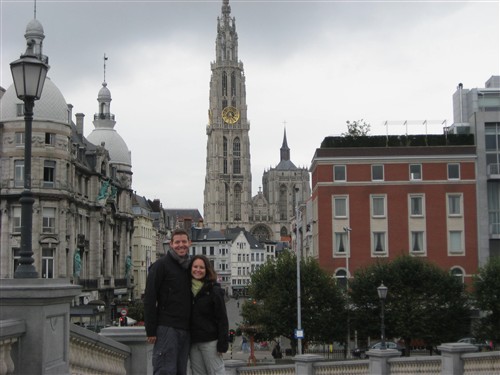
 Since we overdosed on museums in Italy, we decided to do less museums and more aimless wandering in Belgium. The cool autumn air invigorated us to roam the streets, with their quaint, colorful 16th-century Guild Houses; stopping at leisure for frites, waffles and cold Belgian beers served in stemmed glasses. We are unapologetic winos on average but there is something so appealing about sitting on a sunny patio, bundled in jackets and scarves, sipping cold beers on a chilly afternoon. If we make it to 4:00 before happily indulging in our first cold one, we applaud our enormous restraint. That said, we must escape Belgium before our daily unadulterated gluttony expands our waistlines beyond the confines of our pants.
Since we overdosed on museums in Italy, we decided to do less museums and more aimless wandering in Belgium. The cool autumn air invigorated us to roam the streets, with their quaint, colorful 16th-century Guild Houses; stopping at leisure for frites, waffles and cold Belgian beers served in stemmed glasses. We are unapologetic winos on average but there is something so appealing about sitting on a sunny patio, bundled in jackets and scarves, sipping cold beers on a chilly afternoon. If we make it to 4:00 before happily indulging in our first cold one, we applaud our enormous restraint. That said, we must escape Belgium before our daily unadulterated gluttony expands our waistlines beyond the confines of our pants.

 When we finally reemerged, Car Free Sunday in Brussels was in full swing. Bicycles and pedestrians owned the cobblestone streets. Families pushed baby strollers and everyone from kids to senior citizens glided through town on two wheels. The whole multicultural, multilingual population of Brussels seemed to be outside, enjoying a sunny day in their pedestrian friendly city. It was a beautiful sight.
When we finally reemerged, Car Free Sunday in Brussels was in full swing. Bicycles and pedestrians owned the cobblestone streets. Families pushed baby strollers and everyone from kids to senior citizens glided through town on two wheels. The whole multicultural, multilingual population of Brussels seemed to be outside, enjoying a sunny day in their pedestrian friendly city. It was a beautiful sight.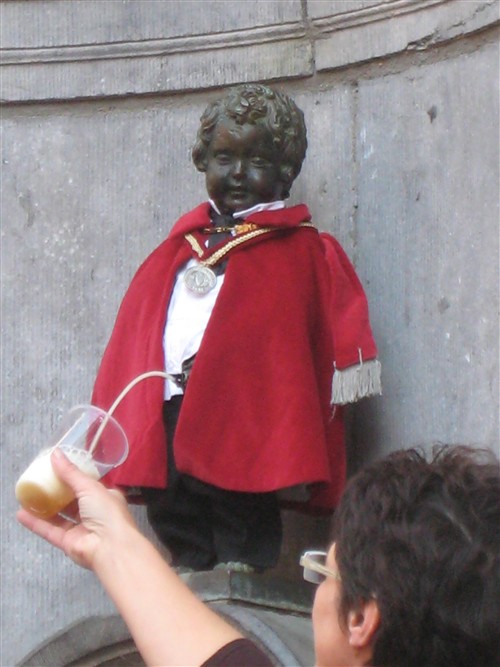 Our next stop was at a small bronze statue – Brussels’ beloved city mascot named Manneken Pis, a.k.a “the Piss Boy”. His likeness is everywhere – on postcards and replicas lining every souvenir shop window. Following the signs for Manneken Pis, we came upon a small square full of commotion. As it turns out, Piss boy has a wardrobe and it was time to change his clothes. A crowd had gathered around his fountain, including a group of cheery old men, dressed in garments identical to the Piss Boy’s, drinking beer, singing songs and pushing around a replica of the statue on a cart, making it “piss” on the shrieking onlookers and laughing all the way. While this was going on, one man was gingerly changing the Piss Boy’s clothes with the utmost love and affection, ruffling his bronze hair and pinching his nose. When the little statue was decked out in his new duds, he was hooked up to a beer keg and cheered on as his stream filled cup after cup with the local grain. What a spectacle!
Our next stop was at a small bronze statue – Brussels’ beloved city mascot named Manneken Pis, a.k.a “the Piss Boy”. His likeness is everywhere – on postcards and replicas lining every souvenir shop window. Following the signs for Manneken Pis, we came upon a small square full of commotion. As it turns out, Piss boy has a wardrobe and it was time to change his clothes. A crowd had gathered around his fountain, including a group of cheery old men, dressed in garments identical to the Piss Boy’s, drinking beer, singing songs and pushing around a replica of the statue on a cart, making it “piss” on the shrieking onlookers and laughing all the way. While this was going on, one man was gingerly changing the Piss Boy’s clothes with the utmost love and affection, ruffling his bronze hair and pinching his nose. When the little statue was decked out in his new duds, he was hooked up to a beer keg and cheered on as his stream filled cup after cup with the local grain. What a spectacle! On our way back to the hotel, with happy hearts and even happier round bellies, we suddenly heard classical music – loud classical music. Rounding the corner, we looked up to discover a man with a full DJ setup, spinning lively classical tunes from the top floor balcony of a vacant building in the middle of the city. A crowd had gathered on the street below, mesmerized by the melodies that filled the cool night air and resonated through the streets. Naturally we wondered, Is this guy going to get arrested for disturbing the peace? This can’t be legal. Then we read on a flyer that this performance was part of a free concert series – Le Concert Invisible – that this guy puts on at random locations around the city. Everyone loved it.
On our way back to the hotel, with happy hearts and even happier round bellies, we suddenly heard classical music – loud classical music. Rounding the corner, we looked up to discover a man with a full DJ setup, spinning lively classical tunes from the top floor balcony of a vacant building in the middle of the city. A crowd had gathered on the street below, mesmerized by the melodies that filled the cool night air and resonated through the streets. Naturally we wondered, Is this guy going to get arrested for disturbing the peace? This can’t be legal. Then we read on a flyer that this performance was part of a free concert series – Le Concert Invisible – that this guy puts on at random locations around the city. Everyone loved it.
 Walk through Venice at lunchtime, getting lost in the senseless maze as you follow your nose toward the tantalizing aromas of fresh baked pizzas, pastas and bread wafting through the lanes while trying not to succumb to the temptation of the gelato shops before lunch. The tranquility of morning has been trampled by a parade of tourists, moving through the narrow alleys like ants on a wall. Water taxis, ferries, and the quintessential Venetian gondolas maneuvered by burly, tattooed gondoliers in striped shirts navigate the canals. Almost everyone you pass is holding either a slice of pizza or a gelato cone. The outdoor cafes and fine restaurants are full of holidaymakers, indulging in three-course lunches and bottles of wine. Around every bend in Venice is a beautiful photo opportunity, especially the bridges where pretty painted buildings and the sparkling canals form stunning backdrops.
Walk through Venice at lunchtime, getting lost in the senseless maze as you follow your nose toward the tantalizing aromas of fresh baked pizzas, pastas and bread wafting through the lanes while trying not to succumb to the temptation of the gelato shops before lunch. The tranquility of morning has been trampled by a parade of tourists, moving through the narrow alleys like ants on a wall. Water taxis, ferries, and the quintessential Venetian gondolas maneuvered by burly, tattooed gondoliers in striped shirts navigate the canals. Almost everyone you pass is holding either a slice of pizza or a gelato cone. The outdoor cafes and fine restaurants are full of holidaymakers, indulging in three-course lunches and bottles of wine. Around every bend in Venice is a beautiful photo opportunity, especially the bridges where pretty painted buildings and the sparkling canals form stunning backdrops.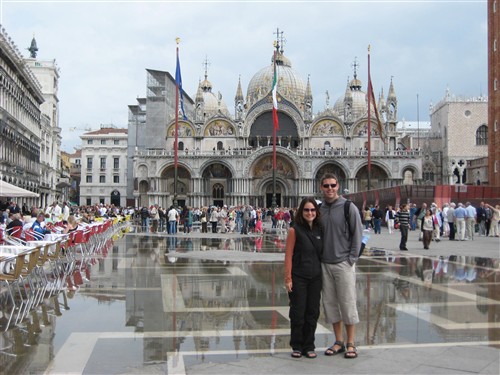 If the Grand Canal is Venice’s lifeblood, then the Piazza San Marco is its heart. Step into the vast, crowded, pigeon-infested square and your gaze will immediately center on the magnificent Basilica di San Marco. Venice’s cathedral – built on the plan of a Greek cross – showcases the Byzantine style in all of its glory with five bulbous domes and dazzling gold mosaics both inside and out. The dim, cavernous interior and the marble floor that has rippled over the centuries together create a dizzying effect. Across from the basilica, the top of the campanile affords a bird’s eye view of the piazza and the best panoramas of the city.
If the Grand Canal is Venice’s lifeblood, then the Piazza San Marco is its heart. Step into the vast, crowded, pigeon-infested square and your gaze will immediately center on the magnificent Basilica di San Marco. Venice’s cathedral – built on the plan of a Greek cross – showcases the Byzantine style in all of its glory with five bulbous domes and dazzling gold mosaics both inside and out. The dim, cavernous interior and the marble floor that has rippled over the centuries together create a dizzying effect. Across from the basilica, the top of the campanile affords a bird’s eye view of the piazza and the best panoramas of the city.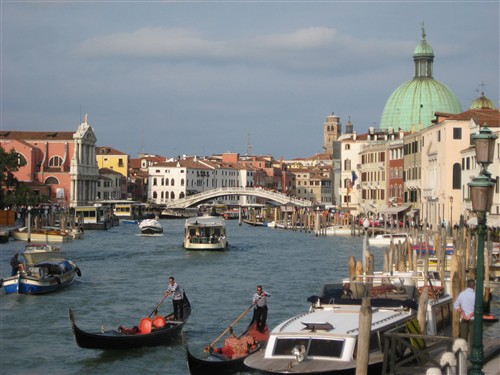 On our last night in Venice, my beautiful and gainfully employed little sister treated us to dinner at one of the expensive and pretentious restaurants on the Grand Canal in view of the Rialto Bridge. With the moonlight sparkling on the water, we savored juicy Chianti over courses of meat, seafood and pasta. It was the perfect exclamation point to Venice, where we indulged in more gastronomic tourism than any other kind.
On our last night in Venice, my beautiful and gainfully employed little sister treated us to dinner at one of the expensive and pretentious restaurants on the Grand Canal in view of the Rialto Bridge. With the moonlight sparkling on the water, we savored juicy Chianti over courses of meat, seafood and pasta. It was the perfect exclamation point to Venice, where we indulged in more gastronomic tourism than any other kind.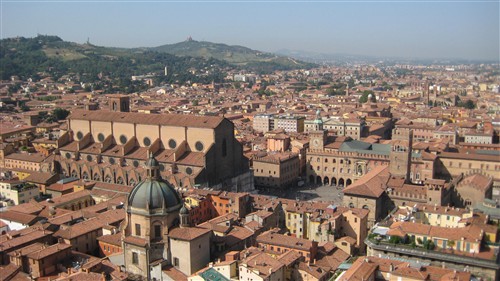
 By ten p.m., we had made up our beds, showered and settled in. A brisk fall chill had swept through the whole building and, as I opened the wardrobe doors to look for heavy blankets, I discovered a pile of possessions behind door number two: leather jacket, white collared shirt, camouflage dob kit, some miscellaneous articles of clothing, and a large metal wrench! The items clearly belonged to a man and our heads began spinning with paranoid ideas of a crazy wrench murder with a key to our room. Why would a backpacker need a wrench?
By ten p.m., we had made up our beds, showered and settled in. A brisk fall chill had swept through the whole building and, as I opened the wardrobe doors to look for heavy blankets, I discovered a pile of possessions behind door number two: leather jacket, white collared shirt, camouflage dob kit, some miscellaneous articles of clothing, and a large metal wrench! The items clearly belonged to a man and our heads began spinning with paranoid ideas of a crazy wrench murder with a key to our room. Why would a backpacker need a wrench? We met Aaron in the hallway at the designated time, loaded the car, and laughed over breakfast at our crazy night in the hostel dorm. Natty has been officially initiated into the hostel world.
We met Aaron in the hallway at the designated time, loaded the car, and laughed over breakfast at our crazy night in the hostel dorm. Natty has been officially initiated into the hostel world.